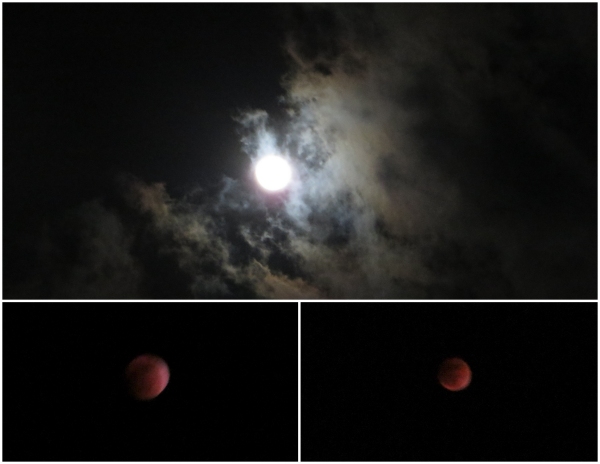Like many large cities, Las Vegas is a melting pot of people … all colors, religions, nationalities, ethnicities. Nowhere is this more evident than in the ethnic markets that abound in the city. Some large grocery stores and many tiny, strip-mall shops offer goods specific to the needs, wants and preferences of “the old country”. We enjoy just stopping in and wandering around, checking out things with which we're unfamiliar, smelling the spices and generally just browsing. It's also a great way to enhance your language skills.

Hispanics comprise about 30% of Clark County's population (the county in which Las Vegas lies), as evidenced by large grocery stores such as Cardenas, Marianas, La Bonita, El Super and several more. We receive their flyers every week in the mail and enjoy our Spanish language lessons as we're reading. I love walking through Cardenas or Marianas especially. The stores are big and modern, but with a decidedly Spanish flair in décor and certainly in the merchandise offered. Instead of white loaf bread, tortillas are on offer and in fact, in several stores there's a tortilleria viewing area for watching the tortillas being made.

There are lots of unusual veggies and fruits for sale that we wouldn't usually see in a regular grocery store here, like tomatillos, cactus leaves, sugar cane, chayote, mounds of jalapeno peppers and huge calabazas (squash). We saw a mountain of piloncillo on sale and it took us awhile to figure out it was formed, cone-shaped Mexican brown sugar.

Colorful piñatas hang from the ceiling and the walls are decorated in a Spanish/Mexican motif. Why not? After all, Las Vegas was once part of Mexico and it was a Mexican trader who first discovered the “oasis” for weary travelers here and named it Las Vegas, the meadows.

The Asian population has doubled over the past 15 years and Asian stores are flourishing. We stopped in at Ranch 99, a popular Asian supermarket that was celebrating the grand opening of a new store. It was absolutely wonderful. Red Chinese lanterns hung from the ceilings. In addition to the usual products you'd see on any grocery shelf, there were all sorts of Asian spices and sauces, an entire rice aisle, sweets and sours. Seaweed snacks were on sale. Canned jackfruit, lychee and sapota were available. Asian beers like Saporo, Tsingtao and Kirin were stacked on end caps. I was pleased to see Year of the Monkey graphics on the Tsingtao six packs and fine, colorful dragons on the Kirin. A change of pace from the Budweiser Clydesdales.

The best part of Ranch 99 was the live fish tanks. Catfish, tilapia, carp and lobsters swam around in their respective tanks, waiting for customers to choose them. Talk about fresh! On second thought, “being chosen” is probably not all that great if you're the fish. Salmon heads were on sale at 99¢/pound.

We also stopped at Las Vegas' Chinatown. It's an interesting part of town at the corner of Wynn and Spring Mountain. All the signs are in Chinese although Filipino, Japanese, Vietnamese, Thai and Indonesian all seem to be well-represented in restaurants and shops.

There's an elaborate paifang (traditional Chinese entry arch) and the area roofs are all embellished with tiny, classic animal statues known as roof charms.

A huge statue of Xuanzang, a legendary priest who traveled with his disciples (a monkey, a pig and a goblin) in search of Buddha, is the centerpiece of the market area. We learned a bit of Chinese mythology while touring the ethnic markets.

India Market caters to the Asian Indian population. Instead of white bread or tortillas or mung bean buns, we found naan, the traditional, delicious Indian flatbread, on sale. Ads for the upcoming Holi, Festival of Colors, celebration were posted on the windows. Rose water and ghee and dal and lentils were being offered. The aisles were narrow and the shelves crammed with interesting items. Indian spices were pungent and plentiful. Ganesh and other Hindu gods stood sentry over the aisles.

The Aladdin Market specializes in mid-Eastern foods. Fresh pita bread filled a center aisle table and customers were scoffing it up continually. Turkish coffee and exotic teas, cans of stuffed grape leaves and fried eggplant, and jars of hummus and Moroccan harissa lined the shelves. Samovars were for sale. Fresh honey-infused baklava was available in the pastry area. The shop was filled to capacity with products and more were being delivered while we visited.

We didn't spend enough time in each shop and there were still more shops that we didn't have a chance to visit like Chez Chantal, an African-Caribbean store, and The Brazil Store. There are Italian trattorias like Siennas and Kosher delis and all sorts of little shops catering to specific appetites and niches in this city's diverse population. I'm sure we'll discover many more on subsequent visits to Las Vegas and we'll make an effort to seek them out.
It's possible to travel the world and sample different cultures without even leaving the city … just try their food. Though we enjoy traditional American fare, it's interesting to taste the traditional foods of other cultures and people, and what better variety than at the markets where they shop.




















